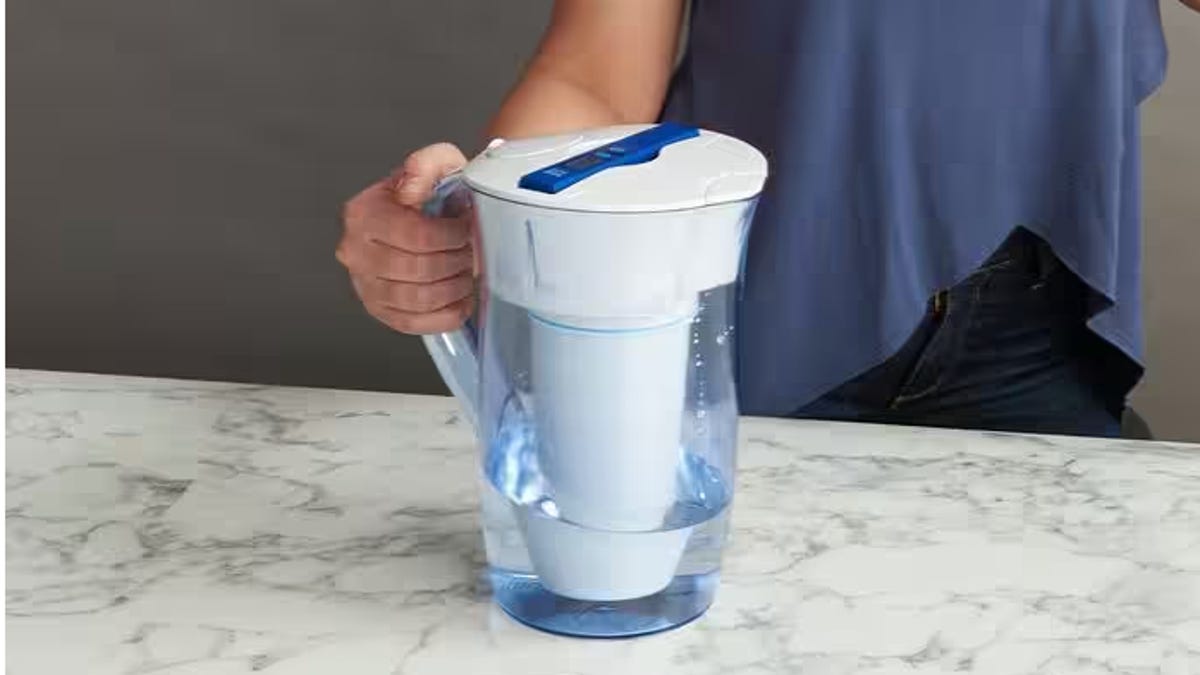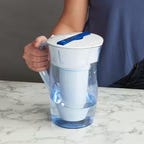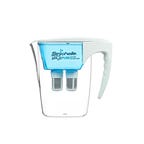Bottled water is so out these days — a waste of money and a scourge on the environment. But that doesn’t mean you don’t deserve perfectly clean, fresh drinking water with none of the gnarly stuff. A water filter pitcher is the easy fix and we tested several to see how clean they actually get your tap water. In three consecutive rounds of testing, ZeroWater trounced the competition and lands atop our list as the best water filter pitcher to buy. It removed a stagger 100% off total dissolved solids and cost just $25.
Brita may be the best-known water filter pitcher brand but that doesn’t mean it’s the best at removing unwanted metals and other materials from tap water. In fact, three years running, another brand has taken the top spot as best water filter pitcher.
The bottom line is, if you want cleaner, better-tasting water, there are several options from the very inexpensive to the sleek yet pricey. Speaking of cost, using a water filter pitcher instead of buying bottled can save you a shocking amount of money over the course of a year. We did the math and this is exactly how much you’ll save.
If you’re ready to take home a pitcher for cleaning, better-tasting water without the cost of bottles, we’ve run the tests and settled on these four models as the best water filter pitchers for 2023.
Best water filter pitchers of 2023
Sizes available MultiplePitcher cost $25Replacement filter cost $30 for two
Three years running, ZeroWater tops our list as the best water filter pitcher for removing total dissolved solids from tap water. In our testing, the ZeroWater filter was pitcher perfect, removing 100% of the TDS from tap water we ran through it and giving us little reason to crown a new king. ZeroWater is so confident in its filter products that each model comes with a TDS water quality tester to see for yourself how well it works. We used our own tester in addition to the one included and the filter delivered a perfect TDS score on both..
Sizes available MultiplePitcher cost $23Replacement filter cost $15 for two
Brita is probably the best-known of the water filter pitcher brands and it performed well in our testing, second only to the ZeroWater in removal of total dissolved materials. The Brita extracted about 40% of the TDS — not a bad showing but still significantly less than the winner.
Sizes available 80 ouncesPitcher cost $25Replacement filter cost $20 for three
This stylish Swedish kitchen brand is best known for its elegant sparkling water makers but now offers an equally eye-catching filter pitcher. It was the best looking of the bunch made from glass and stainless steel frame with a sleek overall design. It also did well removing about 40% of the dissolved solids from my tap water. It’s not as efficient as our top pick, the ZeroWater filter pitcher, but about on par with the Brita models. Plus, this pitcher is good-looking enough to set this out for a dinner party.
Sizes available 64 ouncesPitcher cost $80Replacement filter cost $55 for two
If the goal is to add alkaline to your water, then you’ll want a completely different model. In a previous round of filter testing, we ran pH readings (measurements of how acidic or basic your water is) ranging from 0 to 14; 7 is a neutral reading.
All the water filter pitchers we tested
Here’s a list of the nine pitchers we tested in this latest round:
One key thing to consider from this chart is the estimated life of each pitcher filter versus its cost. The Brita Metro Standard and Everyday models, the Pur Plus and the ZeroWater pitcher all have a lower estimated filter life of up to 40 gallons. While the Brita filter and Pur filter models cost about $7 each, the ZeroWater filters cost $15 each (but are sold in a $30 two-pack). Packets of granules to refill Aarke’s reusable filter cost about $20 for three.
Can you spot the ZeroWater filter? It’s the one on the far right.
As you can see in the picture above, the ZeroWater filter on the far right is massive compared to others. Of course, that doesn’t necessarily equal better performance but in this case, the ZeroWater did soundly outperform the others in removing contaminants. ZeroWater claims to have a five-stage filter that’s better at removing particles while preventing mold from growing with use. Based on our testing results, it seems the brand may be onto something.
(Keep in mind that filter life will vary based on the quality of your tap water and how much your filter has to “work” to remove impurities.)
How we test water filter pitchers
To test these water filter pitchers, we washed each one with mild soap and water, then followed the individual manufacturer instructions for soaking, rinsing or otherwise prepping filters for use.
Testing for TDS (total dissolved solids)
We filled a marked mason jar glass with 16 ounces of tap water and used an Orapxi water quality tester to measure and note the TDS present to see how much was in the water originally and how much had been removed. While the results of my tap water varied slightly each time I filled a fresh glass with 16 ounces the TDS of the water used always read between 47 and 50 ppm, or parts per million. (Read more about TDS here and here.)
Then we poured all 16 ounces into a water filter pitcher, waited for it to filter all the water, poured it into a new glass and took the readings again. For nonalkaline pitchers, you should expect to see a drop in the TDS readings, as impurities and other minerals are removed from the water. We repeated these steps a total of three times on each of the pitchers.
TDS meters are not sophisticated enough to decipher which impurities, nutrients and other minerals each filter manages to remove (or add, in the case of the alkaline pitchers). For that reason, measuring TDS alone as an indicator of water quality has some limitations. But, in general, for a standard filtered water pitcher, we want to see a decrease in the TDS reading. Examples of the most common TDS include “calcium, magnesium, sodium, potassium, bicarbonate, sulfate, chloride, nitrate, and silica,” according to the US Geological Survey.
Measuring water pH
In a previous round of testing, we ran three alkaline water filter pitchers through a pH test — Clearly Filtered, Invigorated Water pH Vitality and Seychelle pH20. All saw an increase in both the pH and the TDS, since they’re designed to add minerals to your water, but the Seychelle saw the biggest pH increase which is why we’ve listed it as the best pitcher to buy if you want to add alkaline to your tap water.
Measuring water taste
This is the least scientific test we’ll run on the water filter pitchers but still an important one. After filtering water with each pitcher, we give the liquid a good old-fashioned taste test. For this latest round of testing, we took sips of each water from each in succession and compared each drink with that of purified bottled water.
Here’s a table of our most recent TDS removal test results. The data represents an average of three test runs for each filter pitcher.
Test results
| TDS (% change) | ||
|---|---|---|
| Aarke Purifier | -39 | |
| Brita Metro Standard | -45.6 | |
| Brita Everyday | -45.6 | |
| Brita Longlast | -3.1 | |
| Hydros | -17.5 | |
| Larg self-cleaning | -2.2 | |
| Lifestraw | -2 | |
| Pur Plus | -6 | |
| ZeroWater | -100 |
Which water filter pitcher removes the most impurities?
The ZeroWater pitcher managed to reduce all of the total dissolved solids in my tap water, from an average initial TDS reading of 57 ppm down to zero. Both Brita pitchers with the standard filter tied for second place, with a reduction of TDS from 57 down to 31 (a 45.6% decrease). The stylish (and expensive) Aarke also did well, removing nearly 40% of the TDS from tap water.
Water taste is a bit trickier to measure, but every pitcher did help reduce the slightly metallic taste of my tap water. Unsurprisingly, the ZeroWater pitcher model tasted the best, with no discernible metallic taste or scent.
Overall, the ZeroWater (ZP-010) made our job pretty easy. It completely dominated in terms of removing TDS and also happened to have one of the sturdiest designs. But there are other good options here too: The Brita Metro Standard is a great budget filter pitcher that weighs less than ZeroWater’s pitchers and has cheaper replacement filters. The Seychelle pH20 is a great pitcher pick if you want to add alkaline to water. And Aarke’s water purifier is my pick for the most stylish water pitcher with a sturdy build, stainless steel frame and glass pitcher. It costs much more than the others but offers a bit of elegance that few others do.
One thing to note is that we’re really testing the filters here and not the pitcher itself. Because most home filter pitchers made by a single brand will use the same filter, you can bet that no matter which size or shape dispenser you choose, the filter should do the same job, for better or worse. ZeroWater, for instance, has a line of about six pitchers, jugs and dispensers in various sizes, all of which use the same very effective five-stage filter. The one caveat within the brands we’ve tested here is Brita which offers a LongLast filter that did not perform as well as the Legacy Brita filters.
Another big takeaway is just how widely filtered water pitchers can vary, both in terms of performance and even in terms of their key function, as in the case of alkaline pitchers. As long as you identify your needs before you buy, you’re bound to find the right filtered water pitcher for you.
Factors to consider when choosing a filter pitcher
Type of filter
Most standard consumer filter pitchers reduce impurities that affect the taste and purity of water such as chlorine, lead, copper and other heavy metals. Other more expensive filter systems such as reverse osmosis and ion exchange can remove bacteria and viruses from water. For this list, we focused on basic, mechanical filters which comprise the majority of home filter pitcher types. Mechanical water filters, while limited in their function, are some of the most affordable and don’t require costly installation.
Size
Before you choose a model, consider how many water drinkers your filter pitcher will be used by. If it’s just you or you and one other person, a small or medium pitcher will likely suffice. If your space is occupied by three or four water drinkers, consider a large pitcher or dispenser jug instead.
Materials
The majority of water filter pitchers are made out of plastic. If you prefer a sturdier build, there are options for water filter pitchers made from glass and metal to add a refined touch to your H20 experience.
Cost
Consider what you’d like to spend on your filter pitcher. There are options ranging from $20 up to $105 or more. If you opt for an integrated water filter system that filters water before it even reaches your tap, you can expect to pay well into the hundreds.
You should also consider the cost of the filters. Most need to be replaced every three or so months and those costs can add up over the course of a year.
How does a water filter pitcher work?
These handy kitchen gadgets work by allowing water to pass through a filter into a reservoir and removing impurities and contaminants in the process. To operate a typical water filter pitcher, you’ll simply pour water from the faucet and let it drip down into the bottom where it’s ready to be poured and consumed. This generally takes one or two minutes and you may need to fill the top reservoir twice or even three times and let it filter slowly down in order to fill the pitcher completely.
What contaminants should a water filter pitcher remove?
Most water filter pitchers will improve the taste and smell of drinking water by ridding it of odorous chemicals such as chlorine. Some more expensive or high-quality models also remove heavy metals, pesticides, PFAs, pathogens and other contaminants. Each water filter pitcher should state clearly on the packaging or website the exact materials it is intended to remove from water.
Which water filter pitcher removes the most contaminants?
In our testing, it was fairly clear which water filter pitcher removed the most contaminants. The Zero Water pitcher, while significantly bigger and more expensive than the other pitchers, removed all of the dissolved materials we were testing for. The Brita filter pitchers came in second place and also removed a substantial amount of contaminants.
Do water filter pitchers remove bacteria?
No. Water filter pitchers will remove many harmful contaminants like lead, copper, chlorine and organic compounds that affect the taste but they will do nothing to kill bacteria. Your tap water should already be treated for bacteria but if you’re concerned about it, a standard water filter is not going to help.
How do you clean a water filter pitcher?
The most important thing you can do to keep your water filter pitcher clean is to change the filter. Most filter pitcher brands including Brita and Zero Water recommend replacing the filter after about 40 gallons but this number varies by model.



